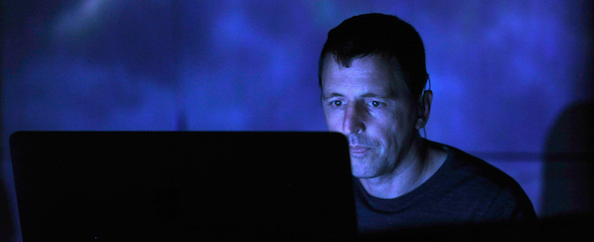It was fitting that at the start of last night’s Master Class session at The Grammy Museum with Atticus Ross, the Academy-Award winning composer was just one of four musicians performing on stage—and he wasn’t even center stage, but tucked off to one side. Throughout the evening’s conversation with Film Independent at LACMA curator Elvis Mitchell, Ross emphasized the importance of collaboration in his work. Ross—who along with Trent Reznor, won the 2010 Academy Award for Best Original Score for The Social Network—echoed Brian Eno’s sentiment that the more minds there are, the more ideas ensue. Ross and Reznor have been making music together for 14 years—it’s the kind of close-knit relationship that Ross relies on and takes comfort in. (His wife composer Claudia Sarne is among his collaborators, and was one of the evening’s performers.) Ross prefers to maintain a small inner circle of collaborators, in part, because “there is a level of intimacy involved in every creative act.” “What you’re talking about is trust,” noted Mitchell. That collaborative ethos is underscored by the fact that, uniquely, Ross’s musical vision often plays a potent role in the shaping of the storyline. “My favorite way of working is to work early on the project,” said Ross. “I want to be very involved very early on.” It’s an approach that injects his ideas more intrinsically into the story. “It’s not just a composer ladling ideas onto the film,” as Mitchell put it. “That process of the music being part of the very DNA of the film changes the film,” said Ross. Working on projects so intimately and over such a protracted timeline isn’t without its complications, he confessed. “You can make your plan and aim at it, but we all know that life doesn’t work out like that,” Ross said. “There are a million bumps in the road.” “You can’t do 10 films a year if you’re getting involved when people are filming,” he pointed out, “but you can do ones that when they leave the studio are ‘I can’t do any better than that.’” After sharing a clip of the opening sequence of Heat, a film Ross revealed is one of his favorites of all time, he talked about the challenge of the key scene at a house in the Hollywood Hills—the way the conversation is handled with the music. “In the Heat open, no dialogue, wonderful landscape… that’s easy, you can spread your wings and fill up the space musically. Trying to score a conversation, that’s a lot harder. That’s why The Social Network is a challenge because it’s just constant talk.” To try to convey that emotion and increasing sense of isolation, says Ross, “It’s incredibly fun, but it’s a challenge.” Ross revealed that recently when working with Michael Mann—who “gets very involved in the temp and I think he’s quite sophisticated musically”—he sent over a cut, and Ross never unmuted the temp track. “I never listened to it.” “I hate temp,” declared Ross. “I don’t like to listen to it. I don’t like the idea of it.” He said an intern of his had shared that basically what he’d learned in his course at UCLA that film composing was, is “you get a film, it has a temp in it and try to copy the temp and not get sued.” “That’s what film schools have done for the last 30 years,” Mitchell pointed out. “My goal in life in general is to always stay interested in whatever way that might be,” said Ross. “And that holds no interest for me whatsoever.” What does keep him interested? Seeking simplicity—”a very difficult thing to attain. It’s very easy to fill things up, especially nowadays” he said, praising Bob Dylan and P.J. Harvey. “You don’t need the frills.” “The music I make is about the things that make the music. It’s not an orchestra,” he said noting that there are a lot of people making interesting electronic instruments that are difficult to figure out and not easy to play, “but exciting in a way that you don’t know what’s going to happen.” After showing a clip of a disturbing scene depicting sexual violence in Girl with the Dragon Tattoo, which merges the sound of an industrial floor cleaner in an otherwise deserted hallway into the music, Ross noted that an otherwise benign sound can become something ominous in the context of such a moment. “The edge of sound design and music and where that meets,” said Ross, “that’s an interesting place to me.” Pamela Miller / Website & Grants Manager
